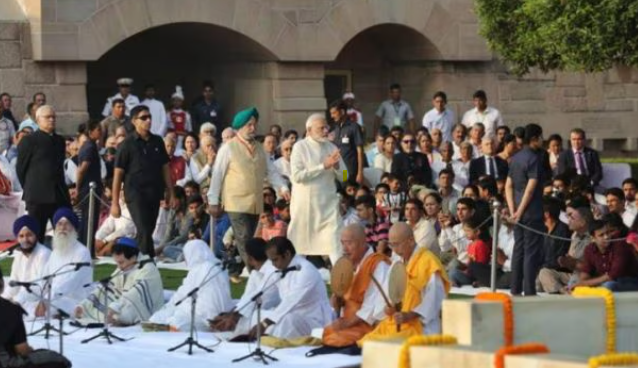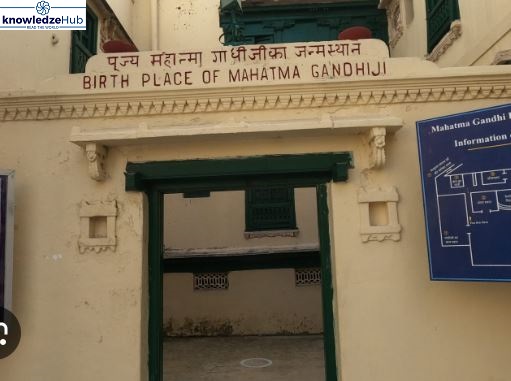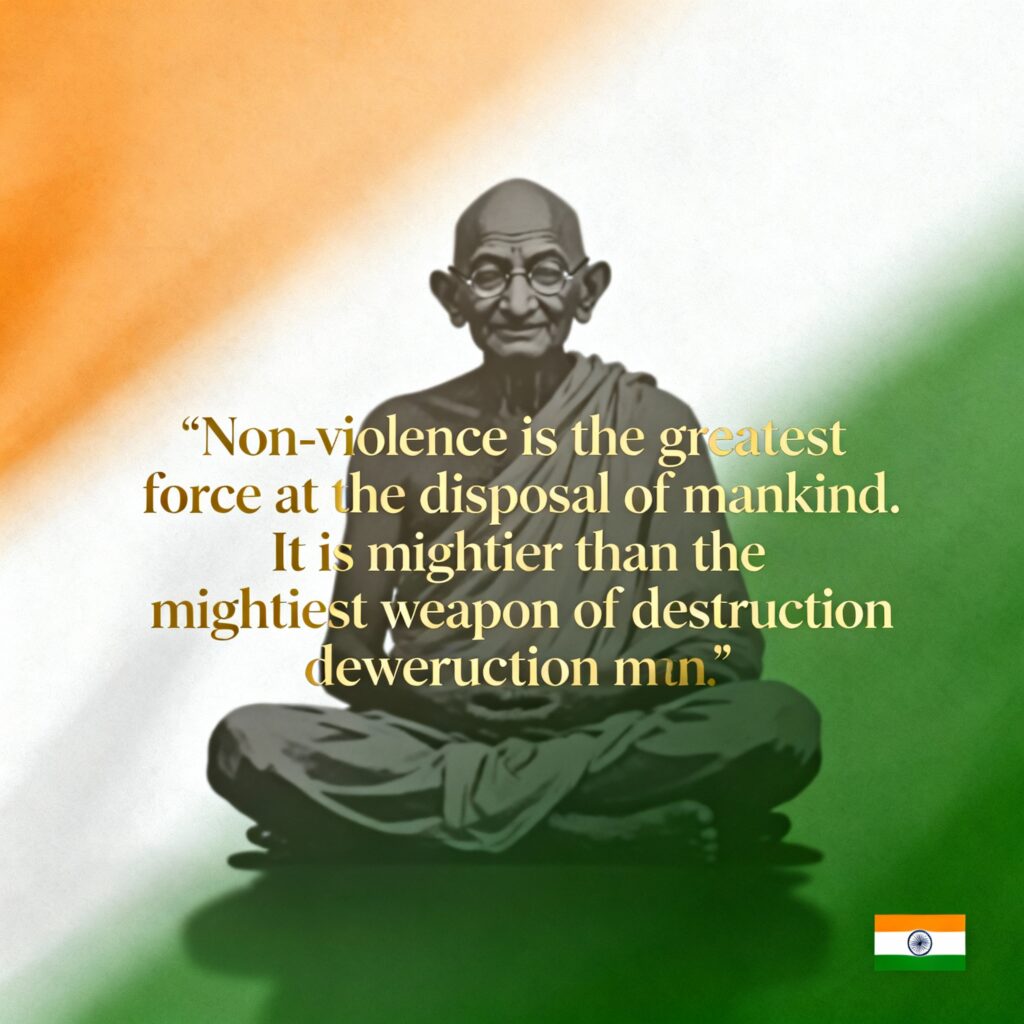Gandhi Jayanti 2026– Holiday Date and Calendar Reference
Gandhi Jayanti is observed every year on 2nd October, the birth anniversary of Mahatma Gandhi. In 2026, the day falls on a Friday. As a national holiday, it will be observed across all Indian states and Union Territories.
📅 Gandhi Jayanti 2026: Quick Reference
| Date | Day | Occasion | Holiday Type |
|---|---|---|---|
| 2nd October 2026 | Friday | Mahatma Gandhi Jayanti | National Holida |
🏛 Government Offices & Public Institutions
| Date | Day | Occasion | Status |
|---|---|---|---|
| 2nd October 2026 | Friday | Gandhi Jayanti | Central & State Govt. offices closed (except essential services like hospitals, police, and emergency departments) |
🌐 General Holiday Status
| Sector | Holiday Status |
|---|---|
| Schools & Colleges | Closed Nationwide |
| Banks (Public & Private) | Closed Nationwide |
| Government Offices | Closed Nationwide |
| Private Offices | Many remain closed; some IT/essential service offices may function |
| Markets & Shops | Partially closed (varies by region) |
Why Gandhi Jayanti is Celebrated in India
Gandhi Jayanti, observed every year on 2nd October, is one of the three official national holidays in India, alongside Republic Day (26th January) and Independence Day (15th August). The day marks the birth anniversary of Mahatma Gandhi (Mohandas Karamchand Gandhi), the “Father of the Nation,” who played a pivotal role in India’s independence struggle through his principles of truth (Satya) and non-violence (Ahimsa).
This holiday is not only about remembering Gandhi as a leader but also about honoring his philosophy and values that continue to inspire movements for freedom, equality, and justice worldwide. From schools and colleges to government offices and public spaces, Gandhi Jayanti is commemorated with prayers, cultural events, seminars, and cleanliness drives in line with his vision of a progressive India.
It is also significant to note that 2nd October is recognized globally as the International Day of Non-Violence, declared by the United Nations in 2007, making Gandhi Jayanti a celebration with international relevance.
Historical Background of Gandhi Jayanti – Life and Legacy of Mahatma Gandhi
Early Life of Mahatma Gandhi
Mahatma Gandhi was born on 2nd October 1869 in Porbandar, Gujarat, into a modest family. His father, Karamchand Gandhi, was a local political figure, while his mother, Putlibai, was deeply spiritual. These early influences shaped Gandhi’s character, instilling in him values of discipline, compassion, and morality.
At the age of 19, Gandhi traveled to London to study law. His time abroad exposed him to diverse cultures and philosophies, but it also reinforced his belief in simplicity and self-discipline. After becoming a lawyer, Gandhi returned to India briefly before moving to South Africa, where he spent over two decades.
Gandhi in South Africa – The Seeds of Satyagraha

In South Africa, Gandhi experienced racial discrimination firsthand. One well-known incident was when he was thrown out of a train for refusing to leave the first-class compartment despite having a valid ticket. Such events sparked his fight against injustice.
It was here that Gandhi developed the philosophy of Satyagraha (truth and non-violent resistance), a principle that would later become the cornerstone of India’s independence movement. His campaigns against oppressive laws in South Africa made him a respected leader and gave him the confidence to replicate similar movements in India.
Gandhi in India – The Freedom Struggle
When Gandhi returned to India in 1915, the nation was simmering with unrest under British colonial rule. Gandhi quickly rose as a leader who believed in peaceful protest rather than violent rebellion. Some of his most notable movements include:
- Champaran Movement (1917): Gandhi’s first major struggle in India, fighting for indigo farmers’ rights in Bihar.
- Non-Cooperation Movement (1920): Urging Indians to boycott British goods, schools, and institutions.
- Salt March / Dandi March (1930): A historic act of civil disobedience against the British salt tax, where Gandhi walked 240 miles to the Arabian Sea to make salt.
- Quit India Movement (1942): A call for immediate independence, uniting Indians across communities under the slogan “Do or Die.”
Gandhi’s Enduring Legacy
Mahatma Gandhi was assassinated on 30th January 1948, but his ideas continue to resonate globally. His philosophy of non-violence influenced great leaders such as Martin Luther King Jr., Nelson Mandela, and Dalai Lama.
Today, Gandhi Jayanti is not just about remembering history—it is about reviving the values of truth, equality, and non-violence in modern times.
How Gandhi Jayanti is Celebrated in India
Nationwide Celebrations

Across India, 2nd October is observed as a national holiday, meaning schools, banks, and government offices remain closed. The celebrations are not about festivity in the traditional sense, but about paying tribute to Gandhiji’s values and spreading awareness of his principles of truth, peace, and non-violence.
Some common nationwide practices include:
- Prayers and Tributes: People gather at Raj Ghat (Delhi), Gandhi’s memorial, to offer flowers and sing bhajans such as “Raghupati Raghav Raja Ram.”
- Educational Events: Schools and colleges organize essay writing, debates, skits, and drawing competitions highlighting Gandhi’s life and philosophy.
- Cultural Programs: Plays, songs, and dances inspired by Gandhian values are performed in community halls and public spaces.
- Cleanliness Drives: In line with Gandhi’s dream of a clean India, cleanliness campaigns are organized under the Swachh Bharat Abhiyan.
- Government Functions: Leaders and dignitaries pay homage to Gandhi’s statue and deliver speeches on his contributions to the nation.
State-Wise Celebrations
While Gandhi Jayanti is a national holiday, each state celebrates it with unique cultural touches:
Gujarat (Birthplace of Gandhi)

- Special events at Kirti Mandir, Porbandar, where Gandhi was born.
- Processions and exhibitions highlighting his personal belongings, writings, and photographs.
Delhi
- The Prime Minister and President pay tribute at Raj Ghat.
- Multi-faith prayer meetings are organized, reflecting Gandhi’s belief in unity across religions.
Maharashtra
- In Mumbai and Pune, cultural groups organize plays and discussions on Gandhi’s contribution to India’s freedom.
- NGOs conduct workshops on non-violence and sustainable living.
Karnataka & Tamil Nadu
- Schools host cultural competitions and speeches in local languages to reach young minds.
- Community service events, such as blood donation camps and food distribution, are common.
Uttar Pradesh & Bihar
- Local villages organize padyatras (peace walks) to spread Gandhian values.
- Gandhi ashrams conduct awareness drives on self-reliance and khadi usage.
International Celebrations
Since the UN declared 2nd October as the International Day of Non-Violence, Indian embassies abroad and Indian communities worldwide organize cultural programs, peace marches, and lectures to honor Gandhi.
Global Recognition – International Day of Non-Violence
Gandhi Jayanti is not just an Indian national holiday—it has also gained global recognition. In 2007, the United Nations General Assembly declared 2nd October as the International Day of Non-Violence, acknowledging Mahatma Gandhi’s enduring influence on world peace movements.
This global observance aims to:
- Promote a culture of peace, tolerance, and non-violence.
- Encourage educational institutions and governments to integrate non-violent principles into policies and social initiatives.
- Highlight Gandhi’s role in inspiring world leaders such as Martin Luther King Jr., Nelson Mandela, and Aung San Suu Kyi.
🌍 Global Celebrations of Gandhi Jayanti
| Country/Region | Type of Event | Organized By | Highlights |
|---|---|---|---|
| United Nations HQ (New York) | Official observance of International Day of Non-Violence | UN & Indian Mission | Speeches, cultural events, peace discussions |
| United States (Various Cities) | Gandhi lectures, peace marches | Indian Diaspora & Universities | Conferences on non-violence, Gandhi statues garlanded |
| United Kingdom (London, Leicester) | Cultural & academic events | Indian High Commission | Exhibitions on Gandhi’s life & impact |
| South Africa (Durban, Johannesburg) | Tribute events | Indian Embassy & Local Communities | Honoring Gandhi’s legacy from his South African years |
| Canada (Toronto, Vancouver) | Cultural festivals | Indian Associations | Gandhi essays, painting competitions for youth |
| Australia (Sydney, Melbourne) | Peace workshops | Indian Consulate | Lectures, screenings of films on Gandhi |
| Japan (Tokyo, Kyoto) | Prayer gatherings & seminars | Universities & NGOs | Discussions on Gandhi’s influence on Buddhist peace movements |
| Global (Indian Embassies Worldwide) | Flag hoisting, cultural programs | Indian Missions | Bhajan recitals, talks, exhibitions |
Gandhi’s Philosophy – Why It Still Matters Today
Mahatma Gandhi was not just a political leader; he was a philosopher and social reformer whose ideas continue to guide humanity. His philosophy was rooted in truth, non-violence, simplicity, and self-reliance, values that remain highly relevant in today’s fast-changing world.
✨ 1. Ahimsa (Non-Violence)
- Philosophical Meaning: Violence, Gandhi believed, only breeds more violence. True courage lies in resisting injustice peacefully.
- Modern Application:
- Promoting peace in conflict zones.
- Encouraging dialogue instead of aggression in politics and communities.
- Anti-bullying campaigns in schools inspired by Gandhian non-violence.
✨ 2. Satya (Truth)
- Philosophical Meaning: Gandhi considered truth to be the ultimate reality and guiding force in life.
- Modern Application:
- Encouraging transparency in governance and business.
- Fighting corruption through truth-based activism.
- Promoting honest journalism and fact-checking in the era of misinformation.
✨ 3. Simplicity and Minimalism
- Philosophical Meaning: Gandhi lived a simple life, wearing khadi clothes and rejecting material luxuries.
- Modern Application:
- The growing minimalist lifestyle movement is in line with Gandhian ideals.
- Sustainable living and eco-friendly fashion (like khadi) resonate with global environmental goals.
✨ 4. Self-Reliance (Swadeshi Movement)
- Philosophical Meaning: Gandhi urged Indians to boycott British goods and promote local industries, especially hand-spun khadi.
- Modern Application:
- India’s “Make in India” and “Atmanirbhar Bharat” initiatives echo Gandhi’s call for self-reliance.
- Supporting small businesses and local artisans is a Gandhian practice in modern times.
✨ 5. Community Service & Equality
- Philosophical Meaning: Gandhi believed in “Sarvodaya” – the welfare of all, especially the poor and marginalized.
- Modern Application:
- Social service movements, NGOs, and welfare programs reflect his vision.
- Campaigns against caste and gender discrimination continue in Gandhian spirit.
Gandhi Jayanti in Popular Culture (Songs, Movies, Literature)
Mahatma Gandhi’s life and teachings have deeply influenced Indian and global culture. His story has been retold through songs, films, documentaries, and literature, making him a household name across generations. Gandhi Jayanti often inspires cultural programs that showcase these works.
🎶 Songs Dedicated to Gandhi
- “Vaishnav Jan To” – A Gujarati bhajan loved by Gandhi and sung at most tributes.
- “Raghupati Raghav Raja Ram” – Played at Gandhi Jayanti events and prayer meetings.
- Patriotic songs in schools and cultural events often highlight Gandhi’s role in India’s independence.
🎥 Gandhi in Cinema & Documentaries
| Title | Year | Language | Type | Highlights |
|---|---|---|---|---|
| Gandhi (Directed by Richard Attenborough) | 1982 | English | Feature Film | Academy Award-winning portrayal of Gandhi’s life and freedom struggle. |
| The Making of the Mahatma (Shyam Benegal) | 1996 | English/Hindi | Feature Film | Focuses on Gandhi’s years in South Africa. |
| Lage Raho Munna Bhai | 2006 | Hindi | Feature Film | Popularized “Gandhigiri” and brought Gandhian philosophy into modern conversations. |
| Mahatma: Life of Gandhi, 1869–1948 (Vithalbhai Jhaveri) | 1968 | English | Documentary | 5-hour detailed documentary with archival footage. |
| Nine Hours to Rama | 1963 | English | Feature Film | Focuses on the assassination of Gandhi. |
| Hey Ram (Kamal Haasan) | 2000 | Tamil/Hindi | Feature Film | Gandhi’s ideology shown against communal violence. |
| Road to Sangam | 2010 | Hindi | Feature Film | Story of Gandhian values applied in a small-town context. |
📚 Gandhi in Literature
- “The Story of My Experiments with Truth” – Gandhi’s autobiography, read worldwide.
- “Gandhi: An Autobiography – The Story of My Experiments with Truth” (Translated) – Available in multiple languages.
- Books by writers like Louis Fischer, B.R. Nanda, and Rajmohan Gandhi further analyze his philosophy and leadership.
- Gandhi Jayanti often sees book fairs and reading sessions dedicated to Gandhian literature.
🎯 Influence on Pop Culture
- The term “Gandhigiri” became popular after Lage Raho Munna Bhai, meaning solving issues with peace and kindness.
- Gandhi statues and busts are installed in universities, parks, and city centers worldwide.
- His face on Indian currency notes keeps his memory alive in daily life.
FAQs on Gandhi Jayanti 2026
1. When is Gandhi Jayanti celebrated?
Gandhi Jayanti is celebrated every year on 2nd October to honor the birth anniversary of Mahatma Gandhi. In 2026, it falls on Friday, 2nd October.
2. Is Gandhi Jayanti a national holiday?
Yes, Gandhi Jayanti is a national holiday in India. All schools, banks, government offices, and most private organizations remain closed on this day.
3. Why is Gandhi Jayanti important?
It is important because it celebrates the life and teachings of Mahatma Gandhi, who led India’s independence struggle through non-violence and truth (Satyagraha).
4. Is Gandhi Jayanti celebrated outside India?
Yes. Since the United Nations declared 2nd October as the International Day of Non-Violence, Gandhi Jayanti is observed in many countries with peace rallies, cultural events, and seminars.
5. What are the main activities on Gandhi Jayanti?
- Tributes at Raj Ghat, New Delhi
- School competitions and cultural programs
- Peace marches and community service
- Bhajan singing and lectures on Gandhiji’s life
6. Will banks be closed on Gandhi Jayanti 2026?
Yes, banks across India will remain closed on 2nd October 2026, as it is a gazetted holiday.
7. Is Gandhi Jayanti a dry day in India?
Yes, Gandhi Jayanti is one of the three official dry days in India when liquor shops and bars are closed.
8. Where is Gandhi Jayanti celebrated most prominently?
While it is celebrated all over India, special events take place at:
- Raj Ghat, Delhi – Gandhi’s memorial
- Porbandar, Gujarat – Gandhi’s birthplace
- Sabarmati Ashram, Ahmedabad – His residence during the freedom struggle
9. Which other leaders share their birthday with Gandhi Jayanti?
Lal Bahadur Shastri, India’s second Prime Minister, was also born on 2nd October. His birth anniversary is celebrated alongside Gandhi Jayanti.
10. Is Gandhi Jayanti connected to the Swachh Bharat Mission?
Yes, the Swachh Bharat Abhiyan (Clean India Mission) was launched on Gandhi Jayanti in 2014, as Gandhiji strongly advocated cleanliness and hygiene.



